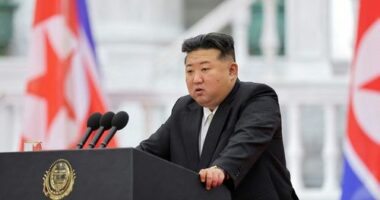Share this @internewscast.com

Aina says it’s hard to keep her students engaged during the hour-long radio lesson, so she turns it on at the start of class but later continues teaching the class herself without the radio. Source: Supplied / Java Films
“The girls here are always worried,” Aina says. “Worried about whether we can go on like this for much longer, worried about government men bursting into the classroom and shutting everything down.”
“We’ve been banned from conventional schools but we’re still learning, and the radio helps us with that,” Aina says. “It gives us the feeling of sitting in a real classroom, and that’s our only motivation.”
Launched in March 2021, just months before the withdrawal of US troops and the Taliban’s return to power, Radio Begum is part of the Begum Organisation for Women, a Paris-based NGO founded by Afghan media entrepreneur Hamida Aman. The NGO also runs Radio Jawanan for male audiences, a TV station, and an online learning platform.
Taliban’s restrictions
Since the Taliban’s takeover in August 2021, women have been steadily excluded from public life in Afghanistan: barred from secondary schools, universities, most professions, and even public spaces such as parks, gyms, and historical sites.

Sabba Chaman, the director of Radio Begum. Source: Supplied / Java Films
Journalism remains one of the few jobs still open to women. However, more than 80 per cent of female journalists have lost their jobs following widespread media shutdowns by the Taliban, according to Reporters Without Borders.
So far, Radio Begum has survived under strict conditions: no politics, no music, and no laughing on air. Programming is limited to education, health advice, and religion.
In February this year, Radio Begum and its sister radio station for male audiences, Radio Jawanan, were raided by the Taliban authorities and suspended. They were accused of “violations of broadcasting policy” and “providing content to a television station based abroad”.

Women-led Radio Begum continues to broadcast in most provinces of Afghanistan despite a growing number of restrictions from the Taliban. Source: Supplied / Java Films
A few weeks later, Radio Begum was allowed to resume operations but under even stricter content restrictions. Two provinces — Kandahar and Helmand — have now prohibited the broadcast of female voices on the radio, effectively banning Radio Begum in those provinces.
Growing isolation
Radio Begum is also one of the few remaining refuges for women to work together, as the Taliban shut down beauty salons, female sports clubs, and women-run businesses such as bakeries.
Hafsa’s favourite subject on Radio Begum is history. The 16-year-old is tuning in from her family’s living room. Her father is too afraid of the Taliban to send her to a secret school. In their region, two have recently closed.

Sixteen-year-old Hafsa is one of millions of Afghan girls who were barred from continuing secondary and higher education by the Taliban. Source: Supplied / Java Films
“I feel sad. As a woman, I’m being punished and I have to stay at home,” she says. “The Taliban believe that girls are inherently degraded and that their role is to stay at home, good for nothing.
When I see my brothers off to school in the morning, I’d really like to go too and meet up with my classmates. I really miss them.”












